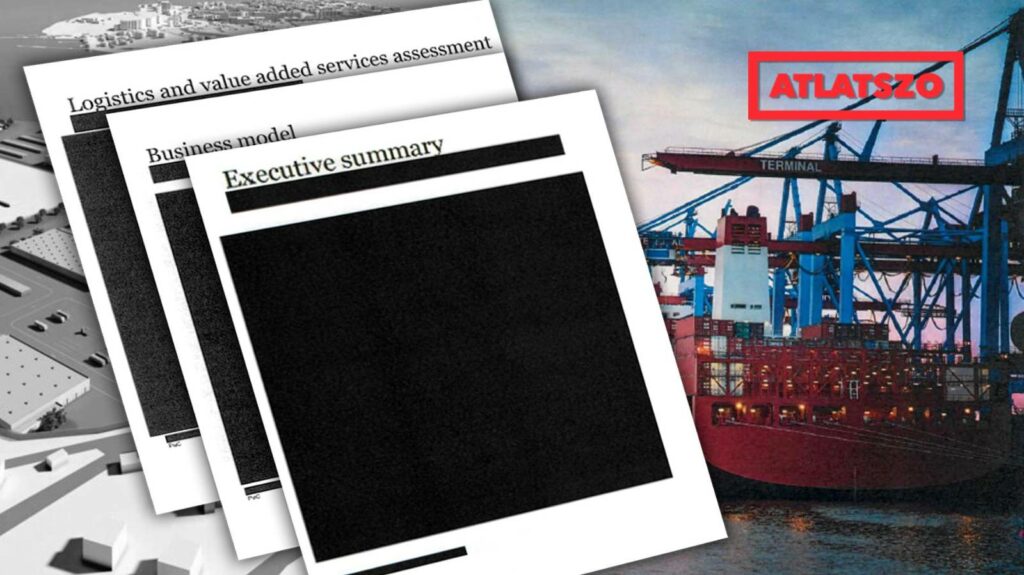The https://english.atlatszo.hu use cookies to track and profile customers such as action tags and pixel tracking on our website to assist our marketing. On our website we use technical, analytical, marketing and preference cookies. These are necessary for our site to work properly and to give us inforamation about how our site is used. See Cookies Policy
Hungarian Adria Port project “discloses” impact study, redacts almost all of it
The Hungarian Ministry of Foreign Affairs’ company paid 160 million HUF for an impact study about the planned port in Trieste. What it is about is a mistery – when we requested a copy of the study, they sent a document with almost all of the content redacted.
Last August, we filed a freedom of information request to the Adria Port Zrt., a project company responsible for the Hungarian government’s port building project in Trieste, Italy. We asked for a copy of the impact study the company paid 160 million HUF for, however, they refused to release the document, citing pre-decision and business confidentiality reasons.

After we filed a complaint to the National Authority for Data Protection and Freedom of Information, the state-owned company has now finally sent us the impact study for the port of Trieste. The only problem: most of the document’s contect is covered with black marks.
Business secret with public funds
Foreign Minister Péter Szijjártó announced in the summer of 2019 the purchase of “a 32-hectare site with a 300-metre-long coastal strip in the port of Trieste for €31 million under a 60-year concession contract”. The area was previously an oil refinery, which left behind significant pollution. It lacks a port and a logistics center, which have to be built from scratch, at a massive expense.
Adria Port Zrt, the state-owned company established for the Trieste port project, launched a public tender for the feasibility study of the port of Trieste three and a half years ago, in January 2021.
The tender was won by PricewaterhouseCoopers (PwC) Hungary Ltd. in May 2021, out of seven bidders, with a net bid of €445,000 (HUF 160.2 million at the then exchange rate).
The company’s brief was to present “a technically feasible and commercially advantageous development plan and business model”.
Almost two years after the deal was announced by Péter Szijjártó, and several months after the sale closed at the end of 2020.
In August last year, we requested a feasibility study from the state-owned company set up for the Trieste port project in a public data request. However, Adria Port Zrt. refused to release the document, claiming that “the feasibility study in question is considered to be pre-decisional data and a business secret”. This was rather strange in the light of the fact that the government decisions on the Trieste site had obviously already been taken, as at the time of our request for information the industrial park had already been purchased almost 3 years ago and preparations for its development had already started.
Published and unpublished
We considered the refusal of the data request and the non-disclosure of the feasibility study to be unlawful, and we referred the matter to the National Authority for Data Protection and Freedom of Information (NAIH). Following our complaint, the NAIH conducted an investigation, and as a result, Adria Port Zrt. has now sent the impact study in mid-November 2024, warning the they had to „omit information that, under the relevant legislation, we must refuse to disclose.”
While redacting some information (such as personal data, including phone numbers and addresses) is not unusual, the case of the Trieste port is different:
Of the 192 pages of the assessment, 167 pages were completely blacked out and 7 were partially blacked out.
On most pages, only the header is visible. Even the titles of 2 out of of 14 chapters were redacted, both in the pages and in the table of contents.
A trieszti kikötő hatástanulmánya by atlatszo on Scribd
The information that was not covered does not reveal anything of importance: the clear pages are just stock photos and quotations from the relevant EU and Italian legislation.
This is what Adria Port Zrt. wrote in the letter attached to the document:
“In this context, we would like to inform you that the data, procedures, plans, analyses and other business secrets and preparatory information contained in the Feasibility Study also concern priority foreign economic, foreign affairs and diplomatic interests, as they are data related to the investment under implementation in Italy and to the future development of foreign and foreign economic relations.”
The port is a money sink
Five years ago, in autumn 2019, the government created Adria Port Zrt. to implement the Trieste project. This company bought the land in Italy and the port concession on it until 2074. Adria Port has had revenues every year since 2021, but they have been minimal: around HUF 850,000 in 2021, HUF 5.6 million in 2022 and HUF 6.4 million in 2023. But the company’s expenses are many times higher, spending almost ten times its income on office rent alone – they have one in Budapest and one in Trieste.
In light of all this, it is no wonder that the company, which is under the Ministry of Foreign Affairs, has been making massive losses since its creation: it made a loss of 24.9 million in 2019, 374.5 million in 2020, 354.6 million in 2021, 424.4 million in 2022 and 375.8 million last year.
In other words, Adria Port Zrt. has made a total loss of HUF 1.5 billion so far.
The land is not all right either: although the government calls the Trieste property it has bought a port, it is in fact a former oil refinery that they want to turn into a cargo port for container ships. It will be a big job, because, as HVG reported, the shoreline of the site is only 300 metres long and the water is only 13 metres deep, which means that it is not even suitable for large container ships at the moment, according to the newspaper.
In early December 2022, Foreign Minister Péter Szijjártó said that the development concept to be implemented had been presented and that “an agreement worth €45 million had been reached with Italy, so preparatory investments could soon begin so that Hungarian companies could use the Hungarian-owned part of the port for their export activities from 2026”.
A little earlier, an Italian newspaper, Trieste News, reported that the port would be developed at a total cost of €200 million. Of that amount, only €45 million will be paid by the Italians (from the EU’s recovery fund), so the remaining €155 million (about HUF 64.8 billion) will presumably be paid by Hungarian taxpayers. In the two years since then, the projected sums may of course have increased, but the government says nothing about the project.
Translated by Zalán Zubor. Hungarian version of this story written by Katalin Erdélyi can be found here.
Share:
Your support matters. Your donation helps us to uncover the truth.
- PayPal
- Bank transfer
- Patreon
- Benevity
Support our work with a PayPal donation to the Átlátszónet Foundation! Thank you.
Support our work by bank transfer to the account of the Átlátszónet Foundation. Please add in the comments: “Donation”
Beneficiary: Átlátszónet Alapítvány, bank name and address: Raiffeisen Bank, H-1054 Budapest, Akadémia utca 6.
EUR: IBAN HU36 1201 1265 0142 5189 0040 0002
USD: IBAN HU36 1201 1265 0142 5189 0050 0009
HUF: IBAN HU78 1201 1265 0142 5189 0030 0005
SWIFT: UBRTHUHB
Be a follower on Patreon
Support us on Benevity!


